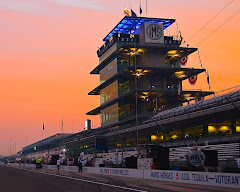
IndyCar fans and journalists appear to be hopeful that Tony Cotman will solve many of the problems that imperil the IndyCar Series. Regrettably, the evidence suggests otherwise.
Like Brian Barnhart, Cotman is apparently determined to dictate the IndyCar supply chain from above. Supporting evidence is provided by Marshall Pruett at SpeedTV.com.
Supply Chain Economics
The practice of dictating the supply chain is one that has to go. Tony George did this initially to ensure that the IRL would have sufficient supply in 1997. It was a short-term solution that somehow became a long-term policy. Cotman then adopted it when he oversaw development of the DP01 for ChampCar. So it would seem that the decision-makers at the IRL now share a bias in favor of micromanaging the supply chain. This is a huge mistake, in my view.
An efficient supply chain must develop organically. Vendors must compete to maximize quality and minimize cost. Teams must be allowed to manage their own product life cycles and spend what they determine they can afford.
When a single vendor is chosen and a maximum price is dictated, that price becomes the effective minimum price because there is no market competition. Costs are artificially increased and an unnatural barrier to prospective new entrants is created. This practice also increases the amount of compensation that the league must provide to teams in order to ensure that enough of them show up to race.
Dictating the supply chain is costing the IRL millions each year, in my view. The decision that Barnhart and Cotman are about the make will certainly cost the IMS more than Ron Green ever did. It is interesting that a sole-source supply chain likely makes technical enforcement much easier than it would be if teams were to choose from multiple options offered by an unlimited number of vendors. Perhaps this is coincidence.
A Better Way
Barnhart and Cotman should be in the business of telling the teams what they may not do. Technical rules are best when they are composed of constraints that evolve in correlation with technologies and economies. Right now IRL management is picking economic winners and losers. This creates gross inefficiencies throughout the IndyCar economic universe.
Recall the USSR. It didn't work there, either.

For example, an economist would not be surprised to learn that the 2010 Honda engine lease is ridiculously overpriced. After all, without Honda, there would be no supply of IndyCar engines. The IRL has therefore surrendered all of its bargaining power to Honda.
In addition, the lease price that is incurred by the teams includes the St. Pete Tax, the Toronto Tax, and the Mid-Ohio Tax. Therefore, the teams and the IRL, via IndyCar TEAM, are sponsoring those three races. That the money is laundered (legally) through Honda does not change the ultimate direction of the cash flows.
Thus, we can conclude that much of the cost of IRL engines in 2010 will have absolutely zero to do with engines. Such is the cost of incompetent management.
Microeconomics 101
Establishing a middle ground between open competition and managed competition is undoubtedly difficult. But I would argue that IndyCar's core economic problems are far more elementary and not at all exclusive to the business of racing. Unfortunately, it seems that the IRL lacks managers who understand basic microeconomics well enough to devise a cost-effective solution.
The lack of sufficiently sophisticated strategic managers is costing good and loyal people their jobs at the World's Greatest Race Course.
The Indianapolis Motor Speedway Board of Directors can and must do better.
Roggespierre



